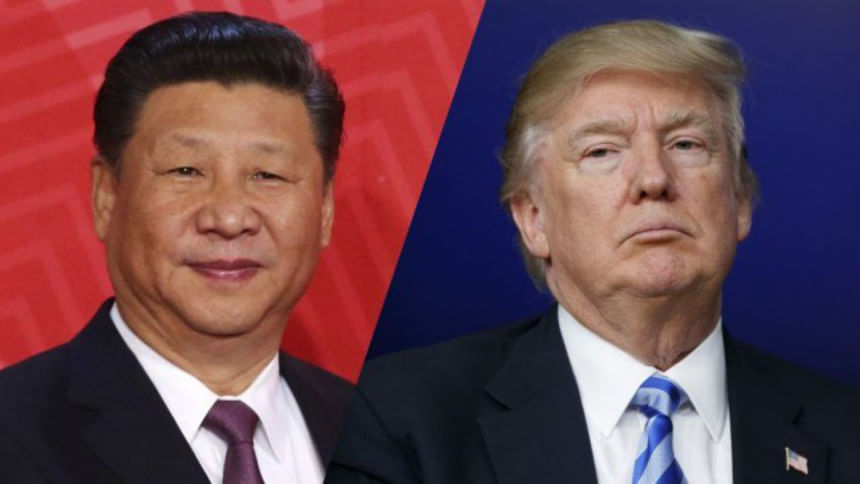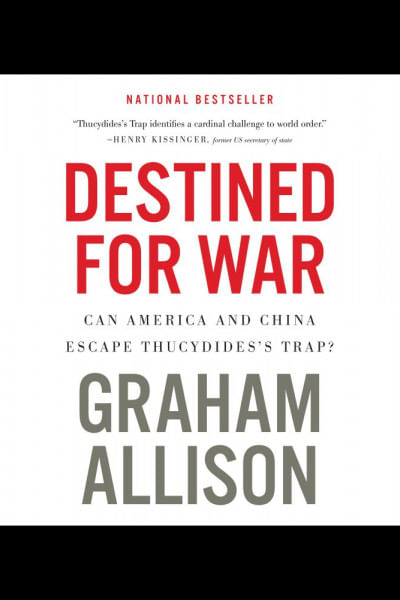US, China: Frenemies?


These days, Harvard Professor Graham Allison is hailed as something of a prophet.
Officials he met in China recently referred to him as the man who "predicted" a clash between the United States and China, he says. "It was not a prophesy," he adds. "I simply pointed out the recurring patterns of history."
"Today, the conversation has moved to the more urgent question, which is, what's to be done, and how to escape the Thucydides' Trap?"
He is talking about his ground-breaking, best-selling book, published in 2017, with the ominous title, Destined for War: Can America and China Escape Thucydides's Trap?
The book, whose title refers to an ancient Greek historian's chronicle of upstart Athens taking on Sparta, caught global attention for its study of 16 periods of power rivalry over the past five centuries. These resulted in a major clash in 12 instances.
"It was the rise of Athens and the fear this instilled in Sparta that made war inevitable," the book notes.
The insecurity engendered in an incumbent power at the prospect of being displaced by an emerging challenger sets them up for a conflict that neither might want. A clash could be sparked by events beyond their control, giving rise to a cycle of actions and reactions, resulting in an unintended conflict.
"It's crazy, but these things can happen," he says, citing as an example the events that led to the First World War.
Prof Allison's analysis about the power dynamic between waxing and waning powers—China, he says, is a "fast moving, unstoppable force heading for an immovable object," namely the US—seems prescient and timely, given the ongoing, increasingly bellicose, Sino-US trade spat.
This took a marked turn for the worse earlier this month, when US President Donald Trump accused Beijing of backtracking on commitments for a proposed trade deal, which Beijing denies.
The sticking points seem to be China's baulking at America's insistence that it cut state subsidies to its enterprises, open up its markets, curb industrial espionage, and agree to a mechanism to enforce any trade deal that might be reached.

These demands cause deep unease in China, as they revive painful memories of the so-called "unequal treaties" imposed on it by western powers in the 19th century. That gave rise to the much-lamented "century of humiliation", when China felt subjugated by western powers, and which it is only now beginning to shake off.
With China rising as an economic power, some voices in Beijing are asserting that the time has come for a rewriting of geopolitical rules framed at a time when China was a shadow of its past greatness.
Clearly, the trade dispute is symptomatic of a wider, deeper tussle under way for geopolitical leadership, as well as technological and military dominance, which is likely to play out for some time.
Against this backdrop, Prof Allison, a former dean at my alma mater, Harvard's John F. Kennedy School of Government, takes pains to add that his book was "not about predicting a war, but how to prevent one".
That, he reveals, is his next big project, which aims to galvanise "strategic imagination" from thinkers around the world to find ways to foresee and forestall potential conflicts.
Lee Kuan Yew, my mentor
At a recent meeting in his book-filled office at the Kennedy school, where he still teaches, Prof Allison, 79, recounts how it was Singapore's founding Prime Minister Lee Kuan Yew who pressed him to spend more time studying China, and who became "his tutor and mentor" on the subject.
Referring to the late Mr Lee as one of the world's foremost China-watchers, Prof Allison recalls how the Singapore statesman, then 88, reacted when he asked him if he thought China under President Xi Jinping was minded to displace the US as the world's pre-eminent power.
"His piercing eyes widened with incredulity, as if to ask, 'Are you kidding me?' He answered directly: 'Of course. Why not? How could they not aspire to be number one in Asia and in time the world,'" he writes in his book.
The driving force behind this push was President Xi's "China Dream"—which Prof Allison sums up as a desire to "Make China Great again".
China, he adds, has already surpassed the US on several economic indicators, such as being the world biggest economy (on PPP terms), its largest manufacturer and consumer of many products, and largest trading power to many countries around the world.
This, he argues, is a "structural reality" that has to be faced by the US, and the world.
Further, with China's huge market and economy, comes what Prof Allison calls "geo-economic power", the ability to hold sway over other countries seeking to participate in its surging economic growth.
He adds in his book: "At the core of these national goals is the civilisation creed that sees China as the centre of the universe ... In this narrative, the rise of the west in recent centuries is a historical anomaly, reflecting China's technological and military weakness when it faced dominant imperial powers. Xi Jinping has promised his fellow citizens: no more."
But for generations of Americans brought up on the idea of the US being at the top of the pecking order on many fronts, with all the power and prerequisites that this entails, the new reality comes as a shock. It leaves many discomforted about what it all portends for them, and the world.
End of the illusion
The view of China as a rising and revisionist power is now widely held in Washington circles, says Prof Allison. Indeed, I found this to be so in many conversations I had with business, political and academic leaders in the US while on a recent visit.
The previous consensus, advanced by the Obama administration, that drawing China into the international system would make it a responsible stakeholder—or strategic partner—in the global order is now regarded as overly optimistic, if not downright naïve. It has given way to a new view of China as a strategic rival to the US, out to displace it from its present perch.
This deep shift in thinking straddles the political divide. It predates and will outlast President Donald Trump's tenure in the White House, notes Professor Joseph Nye, also a former dean of the Kennedy school.
"It would be a mistake to think that the cause of this shift is Trump. There was a fire that was smouldering... Trump is like the man who comes along and pours gasoline on the fire," he tells The Sunday Times.
A report published in February by a special China taskforce set up by the New York-based Asia Society, chaired by seasoned China policy hands Orville Schell and Susan Shirk, sums up this new mood in Washington starkly: "The US and China are on a collision course. The foundations of goodwill that took decades to build are rapidly breaking down.
"Many Americans are starting to see China as a rising power seeking unfairly to undercut America's economic prosperity, threaten its security, and challenge its values, while many Chinese see the US as a declining power seeking to prolong its dominance by unfairly containing China's rise."
The report accuses China of "actions that defy norms of fair economic competition, abrogate international law, and violate fundamental principles of reciprocity".
It concludes: "The Trump administration is justified in pushing back harder against China's actions, but push back alone isn't a strategy."
Beyond being a responsible stakeholder in the global order, many western liberals had also harboured hopes that economic progress would push China to become "more like us", with political reforms following inevitably. Their disappointment that this has not happened is well captured in a much-talked-about book by Robert Kagan, senior fellow at the Brookings Institution, The Jungle Grows Back: America and our Imperilled World.
Kagan says: "Where once many hoped that all nations of the world would converge on a liberal democratic capitalist development, we now see authoritarianism surviving, if not thriving. Where once we believed that economic progress must eventually require political liberalisation, we now see autocracies successfully practising a state capitalism compatible with repressive government."
The idea that economic growth would push China towards becoming more liberal and democratic was not one that was universally subscribed to in Asia. Singapore's Mr Lee, for one, often asserted that rather than aspiring to become a liberal democracy, the Chinese people were seeking progress and development, in pursuit not only of better lives materially, but also a sense of pride and national dignity.
A belated recognition of this is now taking hold in western policy circles, causing some discomfort, even dismay.
Frenemies?
Amid the escalating Sino-US trade spat, with hawks in Washington ratcheting up the rhetoric about a "decoupling" of the US and China economies, and even talk of a "clash of civilisations" with rival political systems coming head-to-head, it is little wonder that musings about the possibility of war might strike some as needlessly alarmist.
But Prof Allison argues that it is precisely the souring of bilateral ties caused by the ongoing trade dispute that risks creating the politics, perceptions and psychology that make a clash harder to avoid.
Addressing this, he says, is his next big project. He is calling for thinkers and players around the world to exercise "strategic imagination" and come up with ways to manage the "systemic risk arising from a structural reality".
Doing so calls for some deep thinking about where tensions might flare up, such as by North Korea or in the Taiwan Straits, or even the South China Sea, and working out pragmatic protocols that might enable such flash points to be avoided, managed, and if need be, defused.
He adds that he has been studying nine possible paths to escape the dreaded Thucydides' trap. Each of these has its own lessons to be drawn, but none is exactly what he is looking for, so his search for ideas continues.
So far, the most promising of these, he says, is the Chanyuan treaty in 1005 between Song dynasty rulers and a proto-Mongolian tribe called the Liao, when both sides agreed to be "rivalry partners". Or, in today's parlance, "frenemies".
"They agreed to be rivals and also be partners. That sounds complex, even contradictory. But in life, we have many such complex relationships," he says, adding that the pact gave rise to 120 years of peace.
Next, he points to the Cuban missile crisis in 1962, when President John F. Kennedy went head-to-head with his Soviet counterpart Nikita Khrushchev, and came close to plunging the world into a nuclear exchange.
Notes Prof Allison: "Kennedy came away from that experience a changed man. And he said, 'We can't do that again.' He forged a new vision. To settle for a world that was safe for diversity."
Given the tectonic shifts taking place in the world today with the rise of China, perhaps it is time to think of ways to "make the world safe for diversity", he adds, proffering the idea of "rivalry partnership" again.
This idea, he notes, is well understood in the business world. Apple and Samsung, for example, compete aggressively in the market, yet Samsung is also a components supplier to its American rival.
Prof Nye takes a similar view, and refers to what he terms "co-operative rivalry". China and the US need to realise that, despite their differences, there are many issues on which they can—and indeed, need to—work together. These range from managing the global economy to tackling climate change.
"The present US president is not interested in climate change. But the next one, whether in 2020 or 2024, is going to have to be," he says.
Such an approach of working together on common challenges, even while competing in other areas, would diffuse some of the inherent tensions between great powers more used to taking a zero-sum view of the world. And doing so might help avoid the dangerous dynamic whereby underlying suspicions give rise to actions and counter-reactions, which—as history shows—can lead to unexpected and unintended conflicts.
Copyright: Asia News Network (ANN)

 For all latest news, follow The Daily Star's Google News channel.
For all latest news, follow The Daily Star's Google News channel. 



Comments